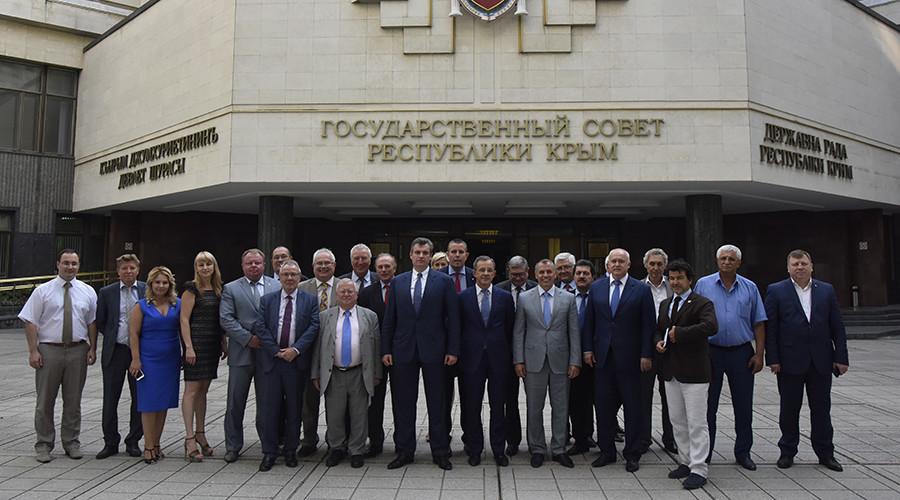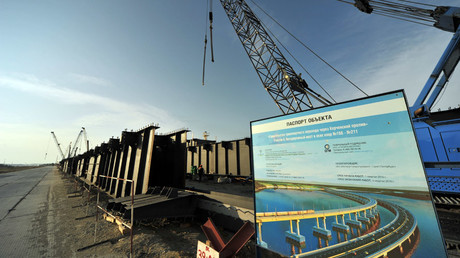
Crimea’s reunification with Russia reflects the will of the majority of the Crimean people, the head of a French delegation visiting the peninsula says. He added that if it had not joined Russia, it could have been turned into a battle zone like east Ukraine.
A group of French PMs led by the National Assembly member and the former transport minister Thierry Mariani, who initiated the debate on lifting the anti-Russian sanctions in the French parliament, went to Crimea to see what life was like. This is the second time he has been to the peninsula since it re-joined Russia.
“The referendum on Crimea’s accession to Russia reflected the will of the people,” Mariani said, adding that, during their visit to the peninsula, the French delegation “got an impression that the decision to reunify with Russia corresponds with the majority opinion” of the Crimean population.
Mariani also stressed that, if it was not for the referendum, the peninsula could have been turned into another battlefront like eastern Ukraine, so “whatever the conditions, the referendum had to be held – and quickly.”
“I am very attentive to everything that is said about the events that occurred two years ago. I believe that, if Crimea had not joined Russia, there would have been the third front here, alongside with the ones in Lugansk and Donetsk,” the lawmaker said as cited by TASS. “It could happen.”
At the same time, Mariani stressed that the major goal of the delegation is to “understand what really happens [in Crimea].” The delegation came to Crimea “to see what has changed” and to discuss“some issues that suddenly acquired significant importance in Europe,”he said referring to the issue of Crimean Tatars.
The lawmaker emphasized that he sees what rights have been granted to the Crimean Tatars and “would also like to see”similar rights are granted to the Russian-speaking minorities in the Baltic States, “for example, in Latvia.”
“It is better to be a Tatar in Crimea than a Russian in Latvia. But Europe prefers to forget about it,” Mariani told RT France.
Other members of the delegation also said that they came to Crimea to form an independent opinion about the situation on the peninsula and to see it firsthand.
“The information we receive is often so contradictory that the best way… to understand what happens is to come [here] and to see everything directly on the ground,” Michel Voisin, the head of the French delegation in the OSCE Parliamentary Assembly, who came to Crimea for the first time, told RT France.
He stressed “information coming from the media can be true as well as fake, so every lawmaker should have his own independent vision of such issues as the situation in Crimea.”
Some of the delegation’s members also confirmed to RT France that they see Crimea as a part of Russia and believe that the international community will recognize Crimea’s accession in the coming years.
“I am sure that no one today wants really to return to the previous state of things,” Michel Terrot, an MP from the French Republican Party said, referring to Crimea having been part of Ukraine in 1954-2014.
“I believe that it will take time [for the international community] to officially recognize Crimea [as a part of Russia]. For some years, the situation will remain out of the legal framework but, in fact, Crimea has become a part of Russia … and it will remain as a part of Russia even if the international community is far from recognizing it,” Socialist lawmaker Jerome Lambert said.
“I believe that the issue of the recognition of Crimea will be positively resolved in the coming years. However, it will require effort both from Russia and the international community,” said Patrice Verchere, an MP from the Republican Party.
In the meantime, the parliamentarians also expressed confidence that France should further actively develop ties with Russia regardless of the sanctions imposed against it by the western countries over the situation in Ukraine.
“The issue of relations with Russia is beyond the framework of the internal political struggle. Many lawmakers and many French citizens are really interested in proper development of relations with Russia,” Lambert told RT France.
“I am sure that France will benefit if it will maintain close ties with Russia,” Terrot said.
According to Mariani, almost all members of the National Assembly and Senators that came to Crimea supported the resolutions against anti-Russian sanctions that were adopted by the French legislature earlier this year.
In June, the French Senate voted in favor of a resolution designed to lift EU-imposed sanctions slapped on Russia in 2014 over the crisis in eastern Ukraine and Russia’s reunification with Crimea.
In late April 55 members of the French National Assembly supported a similar resolution, submitted by 85 French MPs calling on the government not to extend EU-imposed sanctions on Russia.
Thierry Mariani already headed another delegation of French MPs that visited Crimea in July 2015. Back then he said that he saw no grounds to keep Russia sanctions in place.
Guards and military band prepare to receive #French delegation to #Simferopol #Crimea led by @ThierryMARIANI
Now, the French delegation consisting of twelve French lawmakers, including both the National Assembly members and the Senators, have arrived on the peninsula for a second time as they take part in a three day visit. The French Foreign Ministry refused to support the lawmakers’ initiative both in 2015 and in 2016.
Meanwhile, European public opinion is gradually shifting in Russia's favor as roughly a third of Europeans and a quarter of Americans consider Crimea a part of Russia two years after its accession, according to a poll conducted by the British research company Populus and its French counterpart Iflop in March.
The Republic of Crimea refused to recognize the new government in Kiev, which came to power through an armed coup in February 2014. Crimea and Sevastopol, a city with a special status on the peninsula, voted for independence from Ukraine and re-joined Russia in a referendum on March 16, 2014. The decision was supported by about 97 percent of voters with an 83 percent turnout.







No comments:
Post a Comment